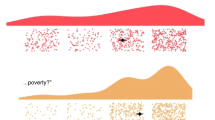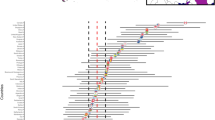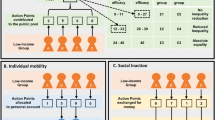Abstract
Amidst rising economic inequality and mounting evidence of its pernicious social effects, what motivates opposition to inequality? Five studies (n = 34,442) show that attributing poverty to situational forces is associated with greater concern about inequality, preference for egalitarian policies and inequality-reducing behaviour. In Study 1, situational attributions for poverty were associated with reduced support for inequality across 34 countries. Study 2 replicated these findings with a nationally representative sample of Americans. Three experiments then tested whether situational attributions for poverty are malleable and motivate egalitarianism. Bolstering situational attributions for poverty through a writing exercise (Study 3) and a computer-based poverty simulation (Studies 4a and b) increased egalitarian action and reduced support for inequality immediately (Studies 3 and 4b), 1 d later and 155 d post-intervention (Study 4b). Causal attributions for poverty offer one accessible means of shaping inequality-reducing attitudes and actions. Situational attributions may be a potent psychological lever for lessening societal inequality.
This is a preview of subscription content, access via your institution
Access options
Access Nature and 54 other Nature Portfolio journals
Get Nature+, our best-value online-access subscription
$29.99 / 30 days
cancel any time
Subscribe to this journal
Receive 12 digital issues and online access to articles
$119.00 per year
only $9.92 per issue
Buy this article
- Purchase on Springer Link
- Instant access to full article PDF
Prices may be subject to local taxes which are calculated during checkout


Similar content being viewed by others
Data availability
All data supporting the findings in this manuscript are publicly available on the Open Science Framework and can be found here: https://osf.io/85pyd/
Code availability
All custom code for data cleaning and analysis supporting the findings in this manuscript are available on the Open Science Framework and can be found here: https://osf.io/7cg2h/
References
Piketty, T., Saez, E. & Zucman, G. Distributional national accounts: methods and estimates for the United States. Q. J. Econ. 133, 553–609 (2018).
The Rise of Canada’s Richest 1% (Canadian Centre for Policy Alternatives, 2010).
Wilkinson, R. G. & Pickett, K. E. The enemy between us: the psychological and social costs of inequality. Eur. J. Soc. Psychol. 47, 11–24 (2017).
Piff, P. K., Kraus, M. W. & Keltner, D. Unpacking the inequality paradox: the psychological roots of inequality and social class. Adv. Exp. Soc. Psychol. 57, 53–124 (2018).
Shariff, A. F., Wiwad, D. & Aknin, L. B. Income mobility breeds tolerance for income inequality: cross-national and experimental evidence. Perspect. Psychol. Sci. 11, 373–380 (2016).
Lamont, M. & Pierson, P. Inequality generation & persistence as multidimensional processes: an interdisciplinary agenda. Daedalus 148, 5–18 (2019).
Jost, J. T., Banaji, M. R. & Nosek, B. A. A decade of system justification theory: accumulated evidence of conscious and unconscious bolstering of the status quo. Polit. Psychol. 25, 881–919 (2004).
Hunt, M. O. & Bullock, H. E. in The Oxford Handbook of the Social Science of Poverty (eds Brady, D. & Burton, L. M.) 93–116 (Oxford Univ. Press, 2016).
Homan, P., Valentino, L. & Weed, E. Being and becoming poor: how cultural schemas shape beliefs about poverty. Soc. Forces 95, 1023–1048 (2017).
Desilver, D. For most workers, real wages have barely budged for decades. Pew Research Center http://www.pewresearch.org/fact-tank/2018/08/07/for-most-us-workers-real-wages-have-barely-budged-for-decades/ (2018).
Grau, L. Illness-engendered poverty among the elderly. Women Health 12, 103–118 (1988).
Engel, K. C. & McCoy, P. A. A tale of three markets: the law and economics of predatory lending. Tex. Law Rev. 80, 1259–1366 (2002).
Gilens, M. Why Americans Hate Welfare: Race, Media, and the Politics of Antipoverty Policy (Univ. of Chicago Press, 1999).
Mani, A., Mullainathan, S., Shafir, E. & Zhao, J. Poverty impedes cognitive function. Science. 341, 976–980 (2013).
Cozzarelli, C., Wilkinson, A. V. & Tagler, M. J. Attitudes toward the poor and attributions for poverty. J. Soc. Issues 57, 207–227 (2001).
Heiserman, N. & Simpson, B. Higher inequality increases the gap in the perceived merit of the rich and poor. Soc. Psychol. Q. 80, 243–253 (2017).
Feather, N. T. Explanations of poverty in Australian and American samples: the person, society, or fate? Aust. J. Psychol. 26, 199–216 (1974).
Feagin, J. Subordinating the Poor: Welfare and American Beliefs (Prentice-Hall, 1975).
Heider, F. The Psychology of Interpersonal Relations (Wiley, 1958).
Weiner, B. An attributional theory of achievement motivation and emotion. Psychol. Rev. 92, 548–573 (1985).
Gilbert, D. T. & Malone, P. S. The correspondence bias. Psychol. Bull. 117, 21–38 (1995).
Lerner, M. J. & Miller, D. T. Just world research and the attribution process: looking back and ahead. Psychol. Bull. 85, 1030–1051 (1978).
McCoy, S. K. & Major, B. Priming meritocracy and the psychological justification of inequality. J. Exp. Soc. Psychol. 43, 341–351 (2007).
Schmidt, G. & Weiner, B. An attribution–affect–action theory of behavior: replications of judgments of help-giving. Personal. Soc. Psychol. Bull. 14, 610–621 (1988).
Zucker, G. S. & Weiner, B. Conservatism and perceptions of poverty: an attributional analysis. J. Appl. Soc. Psychol. 23, 925–943 (1993).
Bullock, H. E., Williams, W. R. & Limbert, W. M. Decoding responsibility: welfare recipients and the enforcement of parental obligations. J. Poverty 7, 13–33 (2003).
Kluegel, J. R. & Smith, E. R. Beliefs about Inequality: Americans’ Views of What Is and What Ought to Be (Routledge, 1986).
Sznycer, D. et al. Support for redistribution is shaped by compassion, envy, and self-interest, but not a taste for fairness. Proc. Natl Acad. Sci. USA 114, 8420–8425 (2017).
Bullock, H. E. & Lott, B. Building a research and advocacy agenda on issues of economic justice. Anal. Soc. Issues Public Policy 1, 147–162 (2004).
Wong, P. T. & Weiner, B. When people ask ‘why’ questions, and the heuristics of attributional search. J. Pers. Soc. Psychol. 40, 660–663 (1981).
Mendelberg, T., McCabe, K. T. & Thal, A. College socialization and the economic views of affluent Americans. Am. J. Pol. Sci. 61, 606–623 (2017).
Rao, G. Familiarity does not breed contempt: diversity and generosity in Delhi schools. Am. Econ. Rev. 109, 774–809 (2019).
Mo, C. H. & Conn, K. M. When do the advantaged see the disadvantages of others? A quasi-experimental study of National Service. Am. Polit. Sci. Rev. 112, 1016–1035 (2018).
Inglehart, R. et al. World Values Survey: Round three – country-pooled datafile. World Values Survey www.worldvaluessurvey.org/WVSDocumentationWV3.jsp (2014).
Guimond, S., Begin, G. & Palmer, D. L. Education and causal attributions: the development of “person-blame” and “system-blame” ideology. Soc. Psychol. Q. 52, 126–140 (1989).
Wiwad, D. et al. The support for economic inequality scale: development and adjudication. PLoS ONE 14, 1–29 (2019).
Most see inequality growing, but partisans differ over solutions. Pew Research Center https://www.people-press.org/2014/01/23/most-see-inequality-growing-but-partisans-differ-over-solutions/ (2014).
Hunt, M. O. The individual, society, or both? A comparison of black, Latino, and white beliefs about the causes of poverty. Soc. Forces 75, 293–322 (1996).
Hunt, M. O. Race/ethnicity and beliefs about wealth and poverty. Soc. Sci. Q. 85, 827–853 (2004).
Osborne, D. & Weiner, B. A latent profile analysis of attributions for poverty: Identifying response patterns underlying people’s willingness to help the poor. Pers. Individ. Dif. 85, 149–154 (2015).
Rasch, D. & Guiard, V. The robustness of parametric statistical methods. Psychol. Sci. 46, 175–208 (2004).
Sawilowsky, S. S. & Blair, R. C. A more realistic look at the robustness and type II error properties of the t-test to departures from population normality. Psychol. Bull. 111, 352–360 (1992).
Rasch, D., Kubinger, K. D. & Moder, K. The two-sample t-test: pre-testing its assumptions does not pay off. Stat. Pap. (Berl.) 52, 219–231 (2011).
Ruxton, G. D. The unequal variance t-test is an underused alternative to Student’s t-test and the Mann–Whitney U-test. Behav. Ecol. 17, 688–690 (2006).
Nickols, S. Y. & Nielsen, R. B. “So many people are struggling”: developing social empathy through a poverty simulation. J. Poverty 15, 22–42 (2011).
World Values Survey (World Values Survey Association, accessed 1 January 2018); http://www.worldvaluessurvey.org
McCall, L., Burk, D., Laperrière, M. & Richeson, J. A. Exposure to rising inequality shapes Americans’ opportunity beliefs and policy support. Proc. Natl Acad. Sci. USA 114, 9593–9598 (2017).
Fehr, E. & Schmidt, K. M. A theory of fairness, competition, and cooperation. Q. J. Econ. 114, 817–868 (1999).
Rand, D. G., Greene, J. D. & Nowak, M. A. Spontaneous giving and calculated greed. Nature 489, 427–430 (2012).
Starmans, C., Sheskin, M. & Bloom, P. Why people prefer unequal societies. Nat. Hum. Behav. 1, 1–7 (2017).
Mummolo, J. & Peterson, E. Demand effects in survey experiments: an empirical assessment. Am. Polit. Sci. Rev. 113, 517–529 (2019).
Weinberg, J. D., Freese, J. & McElhattan, D. Comparing data characteristics and results of an online factorial survey between a population-based and a crowdsource-recruited sample. Sociol. Sci. 1, 292–310 (2014).
Schneider, S. M. & Castillo, J. C. Poverty attributions and the perceived justice of income inequality: a comparison of East and West Germany. Soc. Psychol. Q. 78, 263–282 (2015).
Davidai, S. & Gilovich, T. The headwinds/tailwinds asymmetry: an availability bias in assessments of barriers and blessings. J. Pers. Soc. Psychol. 111, 835–851 (2016).
Obama, B. H. Inaugural Address by President Barack Obama https://obamawhitehouse.archives.gov/the-press-office/2013/01/21/inaugural-address-president-barack-obama (The White House, 2013).
World Bank Open Data (The World Bank Group, 2019); https://data.worldbank.org
Steegen, S., Tuerlinckx, F., Gelman, A. & Vanpaemel, W. Increasing transparency through a multiverse analysis. Perspect. Psychol. Sci. 11, 702–712 (2016).
van Buuren, S. & Groothuis-Oudshoorn, K. Mice: multivariate imputation by chained equations in R. J. Stat. Softw. 45, 1–68 (2010).
Killip, S., Mahfound, Z. & Pearce, K. What Is an intracluster correlation coefficient? Crucial concepts for primary care researchers. Ann. Fam. Med. 2, 204–208 (2004).
Household Income Quintiles (Tax Policy Center, 2019); https://www.taxpolicycenter.org/statistics/household-income-quintiles
Feagin, J. R. Poverty: we still believe that God helps those who help themselves. Psychol. Today 6, 101–110 (1972).
Davis, M. A multidimensional approach to individual differences in empathy. Cat. Sel. Doc. Psychol. 10, 85–104 (1980).
Lakens, D. Performing high-powered studies efficiently with sequential analyses. Eur. J. Soc. Psychol. 44, 701–710 (2014).
Acknowledgements
Funding for Study 2 was provided by a Canada 150 research grant to A.S. Funding for Study 3 was provided by a Department of Psychological Science research grant to P.K.P. Funding for Studies 4a and b was provided by a Psychology Department Research grant to L.B.A. None of these funders had a role in the conceptualization, design, data collection, analysis, decision to publish or preparation of any part of this manuscript.
Author information
Authors and Affiliations
Contributions
P.K.P. and D.W. contributed equally. All authors helped develop the study concepts and contributed to the study designs. Testing and data collection were performed by P.K.P., D.W. and A.R.R. P.K.P., D.W. and A.R.R. analysed and interpreted the data and drafted the manuscript, and B.M., L.B.A. and A.S. provided critical revisions. All authors approved the final version of the manuscript for submission.
Corresponding authors
Ethics declarations
Competing interests
The authors declare no competing interests.
Additional information
Peer review information Primary handling editor: Aisha Bradshaw.
Publisher’s note Springer Nature remains neutral with regard to jurisdictional claims in published maps and institutional affiliations.
Extended data
Extended Data Fig. 2 Study 4a mediation model.
Mediation model with the Nickols and Nielsen45 measure of situational attributions for poverty in Study 4a (n = 611). Situational attributions for poverty mediated the effect of the poverty simulation on support for economic inequality.
Extended Data Fig. 3 The effects of SPENT on support for economic inequality over time.
Graph illustrating the effects of the poverty simulation (SPENT game) versus no-game control condition on support for economic inequality over days between first (Time 1) and last survey (Time 3; n = 111).
Extended Data Fig. 4 Study 4b time 1 mediation models.
Study 4b mediational models showing that the poverty simulation (SPENT) led to reduced support for economic inequality (top) and increased support for redistribution (bottom) by inducing greater situational attributions for poverty at Time 1 (n = 611).
Extended Data Fig. 5 Study 4b time 2 mediation models.
Study 4b mediational models showing that the poverty simulation (SPENT) led to reduced support for economic inequality (top) and increased support for redistribution (bottom) by inducing greater situational attributions for poverty at Time 2 (n = 555).
Extended Data Fig. 6 Study 4b time 3 mediation models.
Study 4b mediational models showing that the poverty simulation (SPENT) led to reduced support for economic inequality (top) and increased support for redistribution (bottom) by inducing greater situational attributions for poverty at Time 3 (n = 110).
Extended Data Fig. 7
Visual inspection of regression assumptions for linear regression in Study 1.
Extended Data Fig. 8
Visual inspection of regression assumptions for multilevel model in Study 1.
Supplementary information
Supplementary Information
Supplementary Methods, Supplementary Results, Supplementary Tables 1–4 and Supplementary References.
Rights and permissions
About this article
Cite this article
Piff, P.K., Wiwad, D., Robinson, A.R. et al. Shifting attributions for poverty motivates opposition to inequality and enhances egalitarianism. Nat Hum Behav 4, 496–505 (2020). https://doi.org/10.1038/s41562-020-0835-8
Received:
Accepted:
Published:
Issue Date:
DOI: https://doi.org/10.1038/s41562-020-0835-8
This article is cited by
-
Why are higher-class individuals less supportive of redistribution? The mediating role of attributions for rich-poor gap
Current Psychology (2023)
-
Gendered Social Perceptions of “The Poor”: Differences in Individualistic Attributions, Stereotypes, and Attitudes Toward Social Protection Policies
Sex Roles (2023)
-
Cross-cultural validation of the Social Justice scale in eight Latin-American countries
Current Psychology (2023)
-
Not all poor are equal: the perpetuation of poverty through blaming those who have been poor all their lives
Current Psychology (2023)



